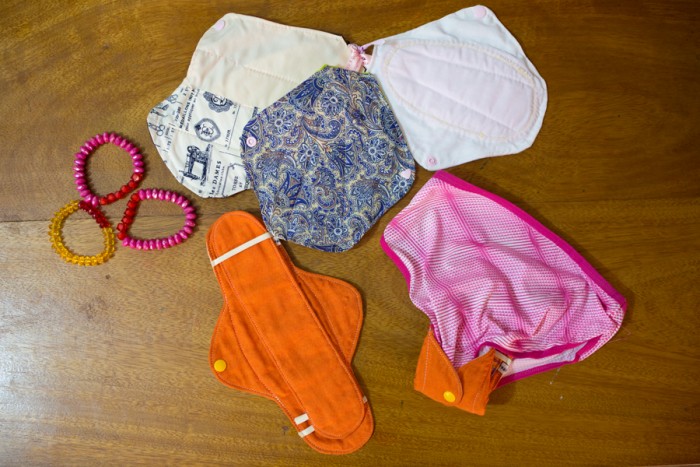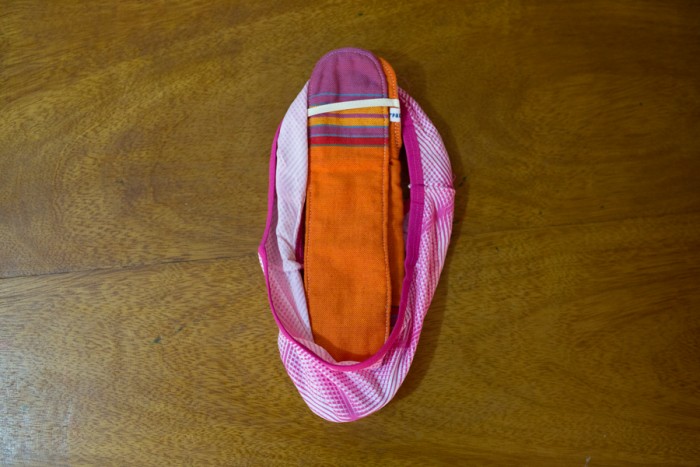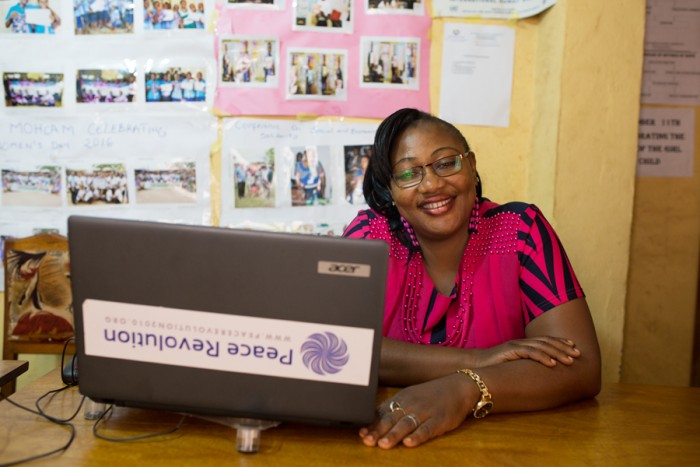September 11th, 2016 by Rachel | Tags: Peace Corps, Women | 7 Comments »
I met a strong and powerful advocate for women and girls, Adah Mbah, who is dedicated and passionate about working in human rights, women’s rights, sexual reproductive health, gender equality, gender based violence, and youth development She is the founder and executive director of a non-profit organization called Mother of Hope Cameroon (MOHCAM), which focuses on improving the lives of women and girls in Cameroon, especially when it comes to domestic violence and sexual reproductive health.
She is also a researcher and is pursuing a second master’s at the Institute of International Relationships Cameroon, where she is acquiring training in peace, gender and human rights. She holds a master’s degree in Peace and International Relations from University of Dschange, a bachelor’s degree in history from University of Yaounde I, and also a diploma in 1st and 2nd grade (early childhood) education from ENS Bambili Annex and ENS Yaounde.
Because I want my American and foreign friends and family learn more about the situation of women and girls in Cameroon, I spent some time interviewing her as she has some eye-opening information to share.
When and why did you start Mother of Hope?
Mother of Hope Cameroon was created on 23 of March 2010 from a life experience of domestic violence, which I decided to share and also to improve on the lives of victims of domestic violence. As a victim of domestic violence, I went through physical, emotional, physiological and economic violence. So I decided to create Mother of Hope Cameroon to empower and educate women and girls victims in desperation.
My vision is to establish the first women and girls empowerment center for peace and security in Cameroon. Here women and girls will be educated on the laws, policies, leadership, how to propagate love, equality, peace, and justice. They will be able to build a support groups which will empower them economically, socially and politically. This will promote the culture of peace and violence extremism in homes, schools, and communities. This center will provide hope to the less fortunate, unprivileged, abused women and girls. The center will create and maintain an atmosphere where women will be able to obtain career orientations, political guidance, socially and economically support. The women and girls will become mentors for many others in their communities. This will help build resilience and sustainable communities. The fear factor will be minimized and women will be able to use the available resources to fight against all forms of marginalization, poverty, the lack of affordable health care delivery systems, drinking water and sanitation, gender-based violence such as socio-cultural, socio-economic and social-political, HIV/AIDS, female genital mutilation and breast ironing. Access to education by women still remains a great challenge with the result that it deprives them of information and economic independence. More training on information communication technology will raise awareness and more women will have access to the internet through sensitization. My purpose is to pave the way for the scared and unsure women and girls in the communities and provide justice.
What does your organization do?
We began working fully in 2013. In 2010-2012, we’re were engaged more in using the social media on the sensitization of gender based violence prevention in communities and schools in Bamenda. So in 2013, we started working and educating girls and women on sexual reproductive health rights, peace building, and justice. Also we started educating women on leadership skills and also on ending the stigma surrounding intimate partner violence. We started visiting many women groups and associations in Bamenda. Today, we have 20 women groups working with Mother of Hope Cameroon, and we’ve been able to talk to 400 women who have testified that it was important for us to talk to many other women and encourage them build creativity and leadership skills towards development.
Then we also have been educating women on human rights and also sexual reproductive health rights. Talking to women about family planning, the use of the female condom and contraceptives, sexual reproductive health and menstruation hygiene management, we realized that many women were using old clothes, towels and some unhygienic products during menstruation. So we decided to start up a campaign on sanitary pads in 2015. We started donating pads to girls in rural communities and schools. We educated them about their bodies and how to calculate their menstrual cycles. They are also taught on puberty and sex education. This is to reduce the high rate of teenage pregnancies in rural communities and keep more girls at school. We also received donations of washable pads from partners and friends from abroad which we distributed to underprivileged women and girls in rural areas, schools, and also to girls living with disabilities. These donations are accompanied with underwear and bras for adolescent girls who are really desperate. We now have a project to produce washable pads which will be able to provide training and skill building to thousands of underprivileged girls in desperation in rural communities and schools. This is an ongoing activity of the organization and we are establishing the sewing of washable pads and needs experts and partners to join her improve on the menstrual health of women and girls in Cameroon. You could donate more sanitary products to improve on the lives of underprivileged girls in schools. We also have an organizational Library to improve on the reading and writing skills of women and youths. Some of our friends and partners have also donated books and magazines for young girls to read about their body and also to improve on their language skills in schools.
Are the disposable pads expensive in Cameroon?
Yes disposable pads are expensive for poor women and girls in Cameroon. But ironically most women and girls use other measures to manage their menstrual health rather than buy pads on monthly base because they are expensive and they wish to save money. We are discouraging the use of disposable pads also because of the high rate of environmental pollution which is another means of fighting climate change. We’re now looking for partners who will join us in the promotion of washable pad manufacturing in Cameroon.

What do you do with peace building?
On peace building, we’re actually advocating for the prevention of violence extremism, preaching on peace, tolerance, interfaith dialogue, reducing trauma, and also reconnecting families who have been affected by violence. We are also advocating for United Nations Security Council Resolution 1325. The resolution reaffirms the important role of women in the prevention and resolution of conflicts, peace negotiations, peace-building, peacekeeping, humanitarian response and in post-conflict reconstruction and stresses the importance of their equal participation and full involvement in all efforts for the maintenance and promotion of peace and security. Resolution 1325 urges all actors to increase the participation of women and incorporate gender perspectives. This is made possible through the collaboration with partner organizations like the Women’s International League for Peace and Freedom Cameroon.
MOHCAM is also propagating a culture of peace building by educating youths in schools through peace clubs on the Resolution 2250. This helps the youths to actively be engaged in shaping lasting peace and also contributes to justice and reconciliation processes.
What are examples of domestic violence women and girls face in Cameroon?
Firstly, you have wife battery. You have incest and rape, breast ironing, parents neglecting their children financially. But wife battery is very high because most women don’t speak out for the fear of losing their marriages and again, the long court sessions. When you report cases, it takes a long time for the solutions for victims of violence. The ignorance of the laws and government policies is also a great hindrance for victims of domestic violence. So most victims’ domestic violence don’t report for intervention which tells from the lack of accurate statistics. Most of the women victims search for other solutions in churches for consolation.
MOHCAM also helps in seeking justice with help of legal advice to establish case files for women victims and their perpetuators taken to court. When women come here, we invite a lawyer who advises on what should be done. We’re working in collaboration with Ministry of Women Empowerment and the Family, Ministry of Youth Affairs and the Ministry of Social Affairs. We also provide counseling sessions and also pre-violence prevention sessions. We work in schools and in human rights, gender and peace clubs which we have created in ten secondary schools in the North West Region.
Give me examples of how girls or women’s lives have been changed positively because of the organization.
MOHCAM has been able to educate five hundred girls in secondary schools and rural communities on menstrual hygiene management. MOHCAM has been able to convinced 5 community leaders and counselors to set laws preventing early and forced marriage of teenage girls. MOHCAM convinced 100 mothers to send their daughters to school in fighting child trafficking. MOHCAM has also been to train 20 women leaders of women groups and associations in Bamenda on leadership skills and entrepreneurship and sexual reproductive health rights. MOHCAM established 10 gender, peace and human rights clubs in 10 secondary schools in the North West Region. MOHCAM has donated menstruation kites to 350 girls in rural communities and girls living with disabilities. MOHCAM has been able to establish three community farms for the production of vegetables to help women and girls to improve on their nutrition and fight against poverty. MOHCAM has given financial support to 20 girls in secondary schools for tuition and also for books. MOHCAM has been able to provide rents, school fees and books a student of management at the University of Bamenda who is a victim of domestic violence.
What are the biggest challenges women and girls face when having a period?
The accessibility of pads. They don’t have it. They don’t have much health education on menstruation which leads to the high rate of teenage pregnancy in schools. We’ve found out that in girls Widikum subdivision that stay away from school because of menstruation. When they get their periods, they don’t go to school. That is the plight of millions of girls in rural communities. You can only find pads on market days or in the big squares in the villages. There are absolutely no sanitary pads available in schools and rural communities. This can also be explained by the bad roads leading to these villages. This makes it difficult to have a ready supply of pads in the rural communities. Statistics which we found from the field portrays that 90% of women and girls do not use sanitary pads. They use old dresses, foams, towels and other methods to handle their menstrual heath and sanitation. Those old things affect their lives as they are often contaminated and prone to infections. The best solutions for menstrual heath and sanitation for women and girls in rural communities and in Cameroon are washable pads.









7 Comments
bih belvian chofor
September 12, 2016 at 1:02 am
God bless ma Adah for the great job you are doing. I have learn a lot since I joint mother of hope Cameroon.it has me to better live a perfect life of peace and happiness because I can handle some problems of life now. Thanks for your motivating word’s
Limen Gladys Foncham
September 12, 2016 at 2:31 am
I know Adah Mbah and the work she does. I hail her initiative and courage to pursue her vision. In fact, she is adequately informed about the Cameroon situation of women and girls. Unlike many other women she has taken the informed choice of breaking the culture of silence in reacting to the plight of women and girls. Adah, more power your elbow. Just continue to break the barriers and level the playing field for the socio_economic and political empowement of girls in Cameroonohhe culture of silence li
Sarajane Aris
September 12, 2016 at 7:07 am
This is excellent and brave trail blazing Adah. Congratulations on pursuing your vision to change the staid quo for women in the Cameroon.
Best,
Sarajane
Sirri Cynthia
September 12, 2016 at 7:17 am
Oh! this is amazing.Mohcam has been a force to reckon with.And I am honoured to be part of it.Reaching out to women and girls is a course all should endeavour to take on.More freeze to your elbow Madam Ada and God bless MOHCAM
Heather
September 14, 2016 at 1:53 am
Heather
Let every woman in the world read this post and know that you have a friend who cares for you. She prays for you, worries about you and joins hand with you. Let’s face this life together.
Elna Niba
September 15, 2016 at 7:30 am
Oh! Ma Adah What a great woman you are, a woman of valor! Its so rare to see someone who cares and fights for the people who cannot fight for themselves, am so proud to part of this great organization, more grace to you Ma Adah and God bless Mohcam
Janet Schiller
November 17, 2016 at 7:46 am
Rachel: I’m a former Peace Corps Volunteer (Guider, Cameroon, 1979-81). I currently volunteer for an organization called Days for Girls. I would love to talk to you about ways to help. My team makes a lot of feminine hygiene kits, but we don’t know anyone who could carry them to Bamenda on a regular basis. I have other ideas I would also like to discuss. Please contact me.